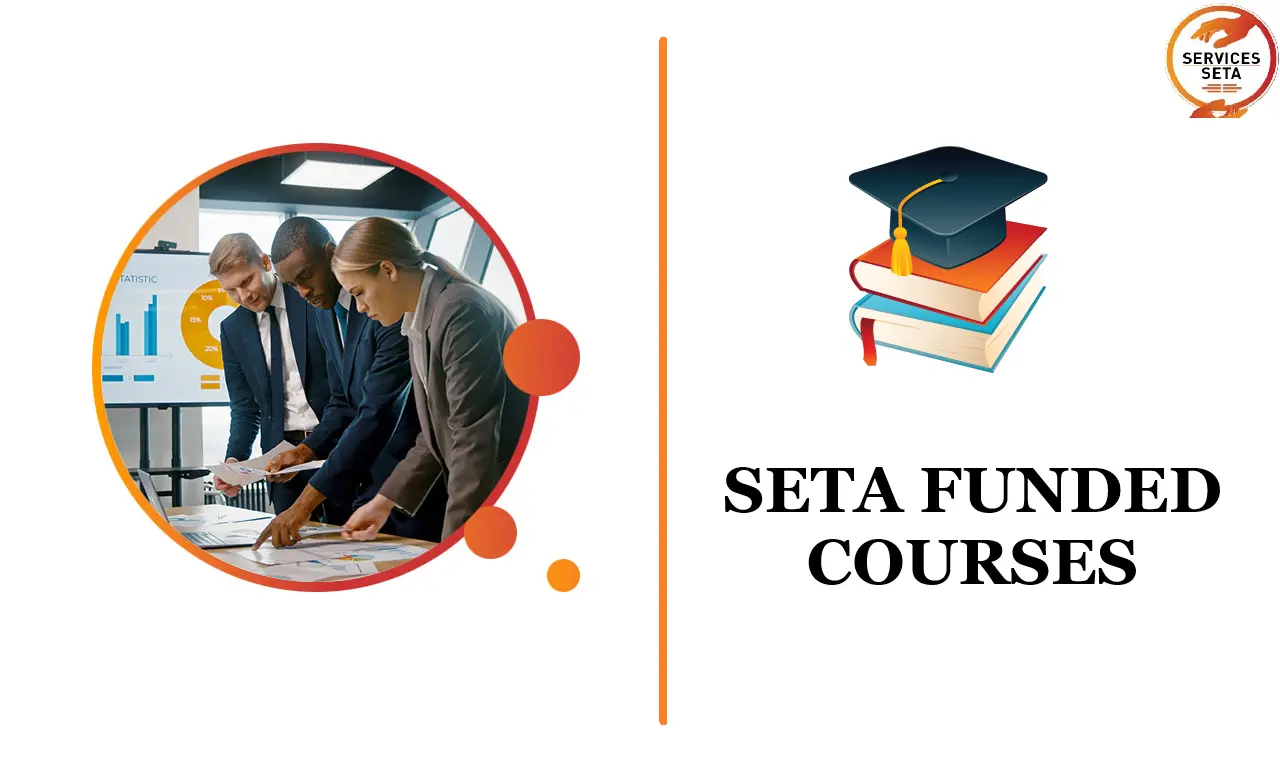SETA Funded Courses: Everything You Need to Know About Free Training in South Africa
Imagine this: You’re scrolling through job ads, feeling frustrated because most positions ask for qualifications you don’t have. Then you discover something incredible – training programmes that won’t cost you a single rand. Sounds too good to be true? Well, SETA funded courses are making this dream a reality for thousands of South Africans just like you.
What Are SETA Funded Courses?
Let me break this down in the simplest way possible. SETA stands for Sector Education and Training Authority. Think of them as special organizations that help people learn new skills without paying for training. The government created these groups to make sure everyone in South Africa can get proper education and job training, no matter their background or bank balance.
When we talk about SETA funded courses, we’re talking about real qualifications that employers actually respect. These aren’t fake certificates or useless pieces of paper. Companies across South Africa recognize these courses because they meet official standards.
Why Should You Care About SETA Funded Courses?
Here’s the deal – education costs money. A lot of money. But SETA funded courses change everything. You get trained, you gain skills, and you don’t have to worry about finding thousands of rands for fees.
But there’s more. Many of these programmes actually pay you while you learn. Yes, you read that right. Instead of paying to study, you earn money as you train. Some SETA learnerships pay over R5000 per month, giving you income while building your future.
What Types of SETA Funded Courses Can You Study?
The variety will surprise you. There are 21 different SETAs in South Africa, and each one focuses on specific industries. Let me show you what’s available:
Business and Office Skills
Want to work in an office? Services SETA offers courses in administration, customer service, and business management. These courses teach you everything from answering phones professionally to managing a whole office.
Construction and Building
If you prefer working with your hands, CETA (Construction Education and Training Authority) provides training in building, plumbing, electrical work, and carpentry. You learn actual trade skills that builders need on real job sites.
Information Technology
Love computers? MICT SETA covers everything tech-related. They train people in coding, network management, and IT support. In today’s digital world, these skills open countless doors.
Healthcare
The Health and Welfare SETA trains nursing assistants, care workers, and other healthcare professionals. With our aging population, these jobs are always in demand.
Hospitality and Tourism
Dream of working in hotels or restaurants? CATHSSETA offers courses in cooking, hotel management, and tourism services. South Africa’s tourism industry needs skilled workers.
Finance and Banking
FASSET provides training in accounting, banking, and financial services. These courses can lead to stable, well-paying careers in offices and banks.
How Do SETA Funded Courses Actually Work?
Let me walk you through this step by step. Understanding the process helps you avoid common mistakes.
The Learning Model
Most SETA programmes use something called “work-integrated learning.” This fancy term simply means you study and work at the same time. You spend some days in a classroom learning theory, then apply those lessons at an actual workplace.
This approach makes sense because you’re not just memorizing facts from textbooks. You’re practicing real job tasks with experienced workers guiding you. When you finish, you have both a qualification and actual work experience.
Duration
Different courses take different amounts of time. Short skills programmes might last just a few weeks or months. Full learnerships typically run for 12 to 24 months. The length depends on how complex the skills are and what level of qualification you’re aiming for.
Costs
Here’s the beautiful part – most SETA funded courses cost you nothing. The SETA pays the training provider. They cover your course materials, assessments, and certification. Some programmes even provide transport money or a monthly allowance.
Who Can Apply for SETA Funded Courses?
This is where things get exciting. You don’t need to be a straight-A student or have connections in high places. SETA programmes welcome ordinary South Africans who want to improve their lives.
Basic Requirements
Most courses ask for basic requirements like:
- South African citizenship or permanent residence
- A valid ID document
- Basic literacy (reading and writing skills)
- Sometimes a minimum age, usually 18 years old
Do You Need Matric?
Not always! Many people think you must have matric to study further, but that’s wrong. Plenty of SETA learnerships accept applicants without matric. These programmes focus on practical skills rather than academic qualifications.
Of course, some advanced courses do require matric or specific subjects. Always check the requirements for each programme before applying.
How to Find and Apply for SETA Funded Courses
Finding the right course takes some effort, but it’s worth it. Here’s how to start your search:
Online Research
Start by visiting official SETA websites. Each SETA has its own website listing available courses and application details. Government job portals also advertise these opportunities regularly.
Company Websites
Big companies often run SETA programmes internally. Check the careers pages of companies you’d like to work for. Banks, retail chains, and mining companies frequently offer learnerships.
TVET Colleges
Technical and Vocational Education and Training colleges partner with SETAs to deliver courses. Visit your local TVET college to ask about current opportunities.
Application Process
When you find a course that interests you, gather these documents:
- Certified copy of your ID
- Latest CV showing your education and any work experience
- Certified copies of your qualifications (if you have any)
- Proof of residence
- A motivational letter explaining why you want to do the course
Submit everything before the deadline. Late applications usually get rejected, no matter how good you are.
Common Mistakes People Make
Learning from others’ mistakes saves you time and frustration. Here are traps to avoid:
Applying Without Reading Requirements
Don’t waste time applying for courses you don’t qualify for. Read every requirement carefully. If they ask for matric mathematics and you don’t have it, rather look for another programme.
Submitting Messy Applications
Your application represents you. Sending blurry copies or incomplete forms makes you look careless. Take time to prepare neat, complete documents.
Ignoring Deadlines
“I’ll apply tomorrow” often becomes “Oh no, I missed it.” Mark deadlines on your calendar and apply at least a week early.
Applying for Too Many Things at Once
Some people apply for every single course they find, even ones that don’t interest them. Rather focus on a few programmes that truly match your goals and strengths.
What Happens After You Apply?
So you’ve sent your application. Now what? Understanding the selection process helps manage your expectations.
Screening
First, administrators check if you meet basic requirements. Applications that don’t qualify get eliminated immediately.
Assessments
Many programmes test applicants through written tests, interviews, or practical assessments. They’re checking if you can handle the course and if you’re serious about learning.
Selection
Competition can be tough, especially for popular courses. Even if you meet all requirements, you might not get selected if many people apply. Don’t take rejection personally. Keep trying different opportunities.
Placement
If you get accepted, congratulations! The SETA or company will tell you when to start, where to report, and what to bring. Follow their instructions exactly.
Benefits Beyond Free Training
SETA funded courses offer advantages you might not have considered:
Employment Opportunities
Many companies hire learners as permanent employees after they complete training. You’ve already proven yourself during the learnership, so they know you can do the job.
Networking
You meet other learners, trainers, and workplace supervisors. These connections can help your career for years to come.
Confidence
Learning new skills and earning qualifications boosts your self-belief. You start seeing yourself differently, as someone capable of achieving goals.
Breaking Poverty Cycles
For people from disadvantaged backgrounds, SETA programmes can be life-changing. You gain qualifications and experience that open doors your parents never had access to.
Tips for Success Once You’re Accepted
Getting into a programme is just the beginning. Here’s how to make the most of it:
Show Up On Time
Whether it’s classroom training or workplace shifts, arrive on time every day. Punctuality shows respect and professionalism.
Ask Questions
Don’t pretend to understand something when you’re confused. Trainers want to help you learn. Ask questions whenever something isn’t clear.
Practice Outside Training Hours
The best learners practice skills in their own time. If you’re learning computer skills, practice at home or at internet cafes. If you’re training as a chef, try recipes when you can.
Build Relationships
Be friendly and helpful to everyone – other learners, trainers, and workplace supervisors. People remember those who are pleasant to work with.
Keep All Your Documents
Save every certificate, assessment result, and letter you receive. You’ll need these documents when applying for jobs or further studies.
Different Types of SETA Funded Learning
Understanding the different programme types helps you choose what suits you best:
Learnerships
These combine theoretical learning with practical workplace experience. They lead to nationally recognized qualifications and usually last 12-24 months.
Skills Programmes
Shorter than learnerships, skills programmes focus on specific competencies. They might teach you one particular skill needed in a job, taking just weeks or months.
Internships
These give graduates practical experience in their field of study. You’ve already completed your qualification, now you need workplace exposure.
Apprenticeships
Traditional trades like plumbing, electrical work, and motor mechanics use apprenticeships. These involve extensive on-the-job training under experienced artisans.
Real Stories, Real Impact
Let me share what these programmes mean to real people. Thabo from Soweto completed a retail learnership through Services SETA. Today, he manages a store in Johannesburg, earning a decent salary and supporting his family. Five years ago, he was unemployed with only matric.
Nomsa from Durban took a hospitality course through CATHSSETA. She started as a trainee receptionist and now works in a luxury hotel’s management team. The free training opened doors she never knew existed.
These aren’t rare exceptions. Thousands of South Africans transform their lives through SETA funded courses every year.
Challenges You Might Face
Being honest about challenges prepares you better than pretending everything’s easy.
Transport Costs
While courses are free, getting to training venues might cost money. Some programmes provide transport allowances, but not all. Plan how you’ll afford daily travel.
Time Commitment
Balancing training with family responsibilities can be tough. Talk to your family before applying, making sure they understand your schedule will be busy.
Academic Challenges
If you’ve been out of school for years, studying again feels difficult at first. Your brain needs time to get back into learning mode. Be patient with yourself.
Not Getting Selected
With limited spaces and many applicants, rejection happens. Don’t give up after one disappointment. Keep applying to different programmes.
The Future of SETA Funded Courses
Skills development remains a government priority. As South Africa’s economy changes, new courses emerge in growing industries. Green energy, digital skills, and advanced manufacturing are areas seeing increased training opportunities.
The system isn’t perfect – sometimes courses take long to start, or administration gets complicated. But the core mission stays important: giving South Africans skills and opportunities to build better lives.
Your Next Steps
Right now, someone just like you is completing a SETA funded course, getting closer to their dream job. That someone could be you next year. Here’s what to do today:
Start researching which SETA covers the industry you’re interested in. Visit their official website and check current opportunities. Prepare your documents so you’re ready when applications open.
Join online groups where people share information about SETA programmes. Facebook groups and WhatsApp communities often post opportunities before they’re widely advertised.
Don’t wait for the “perfect” course. Apply for good opportunities that match your interests and qualifications. You can always pursue additional training later.
The Bottom Line
SETA funded courses give ordinary South Africans extraordinary opportunities. Free training, recognized qualifications, workplace experience, and often a monthly stipend – it’s hard to find a better deal anywhere.
Yes, applications take effort. Yes, competition exists. Yes, programmes demand commitment and hard work. But for anyone serious about improving their career prospects, SETA funded courses offer a proven path forward.
Your future self will thank you for taking that first step today. Whether you’re straight out of school, unemployed for years, or looking to change careers, there’s likely a SETA programme that fits your situation.
The question isn’t whether SETA funded courses can help you. The question is: what are you waiting for?






